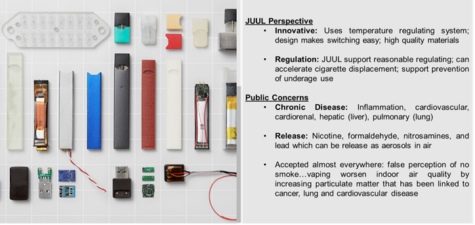
Adopted from www.juullabs.com/our-story
There was a recent article released on AHA Newsroom discussing a lawsuit to expedite the FDA review of electronic (e)-cigarettes and cigars. The article highlights the premises behind the suit filed by several groups to include medical, public health, and pediatricians due to a lengthy delay by the FDA in reviewing laws surrounding e-cigarettes and cigars. These products such as JUUL, are becoming more popular among younger generations due to the increased number of flavors available (mango, crème brulè, and fruit medley), which has been shown to cause cardiovascular (CV) effects. These electronic products are being marketed as being a cleaner, more stylish product that makes cigarette cessation easier, but there is no evidence to that affect.
I was quite surprised to read this because during the AHA EPI | Lifestyle Specialty Conference there was a topic on the dangers of e-cigarettes and its metabolic toxicity as compared to commercial cigarettes. There is increasing research being conducted on the use of e-cigarettes and the impact they have on the population. The lawsuit filed in the federal court in Maryland, is important because the products will remain on the market indefinitely during the review process with no set deadline for completion. Additionally, advertisements are being targeted toward youth causing an uproar with parents and school officials due to overwhelming incidences of bathroom smoking.
During the Stamler session of the EPI | Lifestyle meeting, Lloyd-Jones discussed the risk of considering these products as safe under the premise of them emitting vapor, when they are producing aerosols (a mixture of particles and water) that can contribute to the onset of chronic diseases. These particulate matters produced are equivalent to the size and concentration of commercial cigarettes with similar incidences of toxin-induced CVD. E-cigarettes have been shown to decrease nitric oxide by 16% after 5 minutes but long term exposure slows the heart rate subsequently preventing vasodilation. Chronic inhalation of e-cigarette or cigar vapor was demonstrated to induce pro-inflammatory and pro-fibrotic proteins such as IL-8, angiopoietin-1 by 31 fold, and EGF by 25 fold. There was additional evidence that kidneys, heart, and liver rendered a significant increase in pro-fibrotic pathway activation and altered CV function and elevated blood pressure. Some of the more alarming data demonstrate, among the common side effects of chronic use of e-cigarettes/cigars are popcorn lung and inflammation that leads to organ damage that cause cardiorenal and hepatic disease.
With e-cigarettes and cigars gaining in popularity, I think there should be more research geared toward understanding the impact they have on the general population. There are ongoing studies exploring second-hand and third-hand smoke on vascular and pulmonary health. FDA has made efforts to reduce the level of nicotine in commercial cigarettes to minimally- or non-addictive levels, but for e-cigarettes and cigars are exempt from those requirements making it potentially unlawful and harmful to public health. Furthermore, they have delayed the deadline for filing applications until August 2021 for commercial cigarettes/cigars and other combustible produces until August 2022. I would venture to say, these studies have indicated adverse inflammatory events that will be multiplied by the time the applications are filed, let alone reviewed. Although companies producing e-cigarettes/cigars are not soliciting to children, the flavors they are manufacturing are enticing to the younger generations. In addition, arguments have been made to the affect that there is no diacetyl contained in these pods. Because they have substituted diacetyl with benzoic acid,, the potential of oxidation of the scavenging agent enhance the opportunity for oxyradicals to be produced within the vascular system subsequently increasing inflammatory responses that lead to vascular injury.
Food for thought, there were issues of these pods exploding due to leaks but the overall health outcome may be worse than the threat of combustion. So, if the cost of e-cigarettes/cigars were to be calculated, does it make sense to spend $10 per pack to increase the potential for a chronic disease by subjecting our youth (and the public) to the aerosols from combustible products? Is it in the best interest of the public for nicotine containing products to be regulated?

Anberitha Matthews, PhD is a Postdoctoral Fellow at the University of Tennessee Health Science Center in Memphis TN. She is living a dream by researching vascular injury as it pertains to oxidative stress, volunteers with the Mississippi State University Alumni Association, serves as Chapter President and does consulting work with regard to scientific editing.